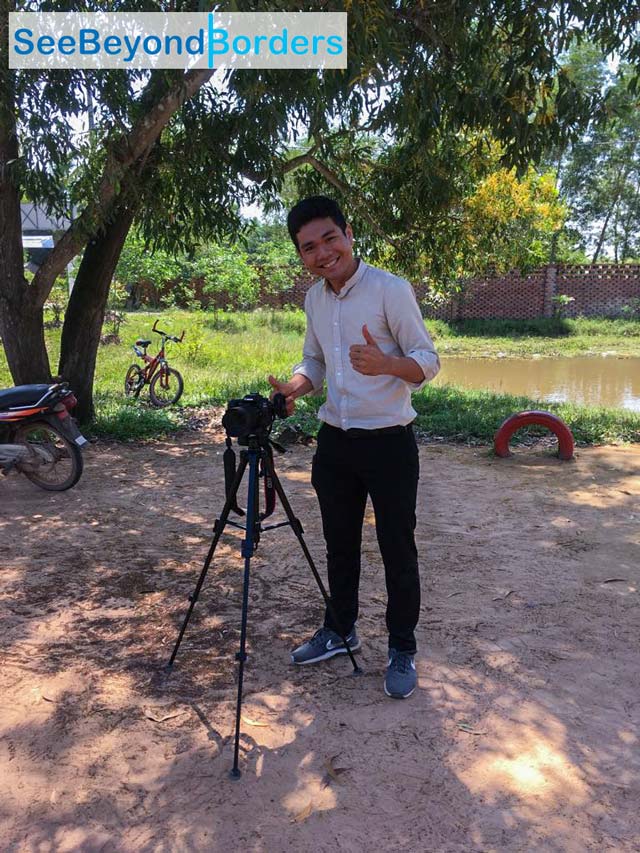Edward Shuttleworth thinks about how we can buy Phearith a better camera and employ another change maker who can ensure more people have a voice.
It’s Saturday and I’m heading back to Siem Reap in a taxi to fly down to Phnom Penh for the night. I am due to meet with the founders of Horseware who have become generous supporters of what we do. With me in the car is Phearith, our young communications officer who is developing a fine skill in photography. Based in Siem Reap, Phearith has been in Battambang for a couple of days to get some footage from the literacy workshop for grade 1 teachers that is today in its third day out in Ek Phnom. He is glowing in his praise for Sophen who has been actually delivering the material as our Master Teacher. He also reflects on how inspiring Pov, our Country Manager, was when he spoke to the teachers about their language – our language as Phearith puts it – during his own visit to the workshop, and wishes he had had the opportunity to learn this when he was at school.

Khann Phearith – Communications and Teaching Resource Assistant
Both Sophen and Pov have had truly transformative experiences themselves through the way the literacy program has taken shape. When Kate first outlined what she thought we should try, I had asked, “So what do you think?” to the Cambodian leadership team. We were discussing Kate’s ideas in response to the simply appalling literacy levels in schools, and the constant requests we were getting to extend what many saw as just a maths program, to also cover literacy.
“Yes” says Sophen, “It’s a good idea”.
“So will it work?” I pressed him. He thought for a moment, that characteristic pose of his, one hand holding his head and the other tucked in under his elbow. Something profound that you had better listen to, was coming.
“No I don’t think so”. There was a brief silence before we all laughed knowing he was probably right.
Two and a half years on and many challenges later, the tide seems to be turning and Sophen and Pov, inspired by what they can see may actually make sense, are winning hearts and minds. None more so than Phearith’s actually, who now starts to tell me about his own education. “By the time I was in Grade 4” he says, “I didn’t know what a sentence was and I could read nothing. I knew I needed to go to a different school, but the closest was ten kilometres away from my house. Eventually, I managed to persuade my Mum to let me go with some other children from my village.”
“How did you catch up with what you should have known by then, and actually learn to read and write?”
“I just worked very hard” was the simple truth of the matter. Of course Phearith is quite exceptional in many ways, one of as yet a small group of young Cambodians who see real possibilities for the future of their country and live their own sense of responsibility for inspiring that change. Our conversation drifts on and I tell him about a story I have heard from one of our team about a group of parents who went to their commune chief to complain about their school principal and also one of the teachers, who never come to school. The Commune collects the parents’ fingerprints and passes the complaint to the local District Office of Education – who do nothing.
“How” I ask, “can the community deal with that?”
And Phearith replies “At least they are doing something, which is more than used to happen!” I hadn’t thought of it like that, impatient as ever, and I ask more questions about how can they have a voice and how can we bring these sorts of things to the attention of a wider and more powerful group – a bit of a favourite subject perhaps as I see influence as everything.
Phearith talks about his friend who was one of very few in his grade four cohort who also studied to grade twelve with him, but has not yet gone on to university. “I try to push him” he says “as we know the real situation, and with our education, can help others to learn about this too”.
And that’s the point of course, slowly, through those we talk about as “Change makers”, Pov, Sophen and Phearith to name a few, people are seeing that we can be better than this and change is coming. In the ensuing silence I struggle with the “it’s not soon enough” conundrum as I look at the passing landscape, bobbing up and down through the endless roadworks. I resolve that we will get Phearith a better camera and perhaps offer his friend a job to work with Phearith while he does further study, and go out to the villages so they can tell some of the stories that sit there unheard and uncared for. All the time I am reminded that literacy is such an important part of the story, how those who can write and encapsulate the message can pass it to those who can read it and make sense of it. Yes, at least we are laying a pathway through literacy that could be transformative.